Gazeta do Povo and RPC TV, 2010

About the investigation
In the Brazilian state of Parana, home to 10 million people, the Gazeta do Povo newspaper and RPC TV spent two years building a database on public spending by the state legislative assembly. Over the course of its investigation, the team found that the assembly had systematically pilfered as much as $400 million in public funds.
At the base of the investigation were the assembly’s official memoranda, or diaries — the record of its daily business — which should have been public but were not. The journalists gathered three years of the documents and entered them in a spreadsheet, filling more than 15,000 lines. By analyzing data on contracts and hiring, and combining it with on-the-ground reporting and crowdsourcing, the team documented millions of dollars pilfered through misuse and the hiring of ghost employees.
Those under investigation did not take the scrutiny well. During the reporting phase, two bombings struck the lobby of the newsrooms, and there were threats to the journalists involved. For their work, the Secret Diaries team — Katia Brembatti, Karlos Kohlbach, James Albert, and Gabriel Tabatcheik — won the Global Shining Light Award in 2011 and the 2010-2011 Latin American Investigative Journalism Award for Best Investigative Report on Corruption. Their work was also honored with two of the top journalism awards in Brazil: the Grande Prêmio Esso de Jornalismo, and the Tim Lopes de Jornalismo Investigativo prize.
Impact
Secret Diaries sparked public outrage across the state, bringing 30,000 people to the streets in anti-corruption protests in 13 cities. The Public Prosecutor created a 20-person task force to investigate the cases, and brought more than 20 criminal investigations based on the team’s findings. More than 30 legislators were investigated and 15 people have already been convicted.
The series “provoked the biggest transformation in the history of the Legislative Assembly of the State of Parana,” the authors later wrote. The chief officers of the Assembly were fired and their assets frozen. The Assembly installed an electronic system to better monitor work time by employees, and a new law was passed establishing criteria for hiring employees. The result: the number of Assembly employees dropped from 2,457 to 1,460, saving more than US$5 million in payroll costs per month.
The investigation also impacted the state of open government in Parana. The official logs of the Assembly are now routinely posted to the Internet, and all official acts of the past five years have been made public.
